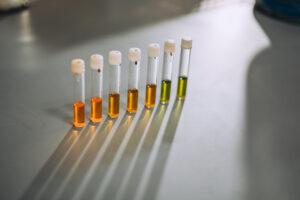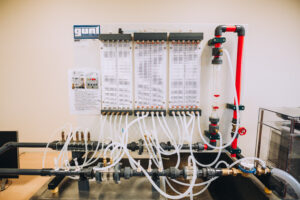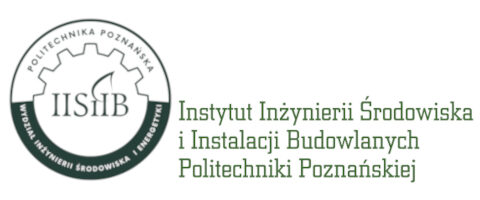

The Institute of Environmental Engineering conducts research and academic work including theoretical analyses, and research and measurement works mainly in the field of environmental engineering, mining and energy.
Selected topics of the research conducted at the Institute are given below (click on the division name to expand the list).
- Wastewater treatment technology
- Efficient elimination of carbon, nitrogen and phosphorus compounds from municipal wastewater
- Enhancement of wastewater treatment processes using the MBBR technology (Moving Bed Biofilm Reactor
- Industrial wastewater treatment, including waste from the food and cosmetics industries
- Removing hazardous pollutants from wastewater
- Physical and chemical analysis of wastewater
- Studying the efficiency of chemical ad biochemical reagents in water, wastewater and soil treatment processes
- Developing municipal and industrial wastewater treatment technologies
- Waste management, biorefineries
- Development of biorefinery technologies (circular economy)
- New concepts in waste management
- Biogas, biofuel and biochemicals production technologies
- Technical and economic analyses of bioprocesses and biorefineries
- Organic waste neutralization through composting
- Sewage systems
- Modelling precipitation water run-off from municipal catchment basins under unsteady flow circumstances
- Precipitation water quality analysis, applications and treatment methods for drinking and technology purposes
- Dig-free technologies for sewage system construction and renovation
- Water treatment technologies, water disinfection and safety
- Advanced and innovative water treatment technologies
- Optimization of operating procedures in water supply systems, smart water grids and searching for new applications of integrated Green Investment Schemes and hydraulic water supply network models
- Technical assessment of the performance and efficiency of water treatment plants and stations
- Evaluation of strategies, concepts and projects concerning water supply system modernization and development
- Managing water and sewage networks
- Evaluation and verification of applications for the approval of water and sewage tariffs for water and sewage companies
- Studying spatial analysis algorithms for water supply and sewage collection systems
- Exergetic analyses of water supply systems
- Water quality analyses in water supply networks
- Developing new mathematical algorithms for controlling elements of water supply networks
- Elements of technical equipment of buildings:
- Assessment, analyses and optimization of thermal and flow parameters of both individual elements and entire systems of technical equipment of buildings, particularly involving heat distribution, ventilation, air-conditioning, water supply, sewage collection and gas distribution, using measurements and simulations
- Simulations of operating parameters of HVAC and water supply installations
- Data analyses of operating parameters of technical equipment systems
- On-site inspections of technical equipment of buildings, including measurements, monitoring and evaluation of heat, ventilation and air-conditioning systems, heat pumps, ground exchangers, boiler stations and heating plants
- Building interior environment and interaction of buildings with their surroundings:
- Energy-saving and passive construction – assessment, analyses, check-up measurements, audits and energy performance of buildings
- Analyses of using renewable energy sources in construction, including bioenergy and heat pumps
- Studying the possibilities of improving energy and health parameters of the interior environment of buildings
- Analyses of physical, chemical and biological air quality inside buildings
- Analyses of building and investment effects on the environment (air protection)
- Research on human-building interaction
- Simulations of operating parameters of thermal insulation of buildings
- Analyses of data on energy consumption in buildings
- Studying interior environment quality
- On-site inspections of existing buildings including air-tightness tests (blower-door test), thermal imaging, measurement and monitoring of environment parameters (temperature, humidity, velocity, solar radiation, thermal comfort, number of particulates and CO2 concentration in the air)
In its research activities, the Institute uses advanced instruments, including:
- a dual-plate FOX 200 instrument for measuring the thermal conductivity of construction materials,
- a NEMo OAQ and MiniXT OnDemand system for recording air quality,
- a Minneapolis Blower Door™ set for testing the air-tightness of buildings,
- a Flir T660 thermal imaging camera for checking the quality of thermal insulation of buildings and industrial structures,
- an automatic Methane Potential Test System for studying fermentation processes,
- bioreactor sets for continuous and batch fermentation processing,
- a gas chromatograph with a thermal conductivity detector (TCD) and a flame ionization detector (FID) for qualitative and quantitative analyses of samples using gas chromatography
The Institute also carries out research projects. Some of them have been listed below (click the division name to expand the list).
In its research activities, the Institute uses advanced instruments, including:
- a dual-plate FOX 200 instrument for measuring the thermal conductivity of construction materials,
- a NEMo OAQ and MiniXT OnDemand system for recording air quality,
- a Minneapolis Blower Door™ set for testing the air-tightness of buildings,
- a Flir T660 thermal imaging camera for checking the quality of thermal insulation of buildings and industrial structures,
- an automatic Methane Potential Test System for studying fermentation processes,
- bioreactor sets for continuous and batch fermentation processing,
- a gas chromatograph with a thermal conductivity detector (TCD) and a flame ionization detector (FID) for qualitative and quantitative analyses of samples using gas chromatography
The Institute also carries out research projects. Some of them have been listed below (click the division name to expand the list).
- Resilient Water Innovation for Smart Economy (REWAISE), Horyzont2020
The goal of the REWAISE project is to create a new “smart water ecosystem”, integrating an intelligent digital framework for decentralised water services and decision-making, involving all relevant stakeholders to embrace the true value of water, reducing freshwater and energy use, and recovering nutrients and materials. The result will be a carbon-free, sustainable hydrological cycle in line with the concept of a resilient circular economy.
https://rewaise.eu/the-project/ - Integrated System for Simultaneous Recovery of Energy, organics and Nutrients and generation of valuable products from municipal wastewater (SIREN), POLNOR2019
The idea of the SIREN is to prove that wastewater should no longer be regarded as a threat, but as a pool of resources with the potential for recovery and generation of many valuable products, such as organic bio-polymers, nutrients, heavy metals, biofuels, thermal energy, etc.
https://siren.put.poznan.pl/pl/strona-startowa/ - WasteValue, POLNOR2019
The WasteValue project is based on the principles of circular economy and focuses on recovering resources from food waste and fish sludge. The primary objective of WasteValue is to develop an innovative biorefinery scheme for the production of high-performance biofuels and a high-quality fertilizer from o variety of waste streams, thereby offering novel means of mitigating climate change and supporting the transition to a future sustainable bioeconomy.
https://wastevalue.put.poznan.pl/ - Production of hydroxyalkanoate copolymers in gas fermentation of methane with mixed microbial consortia (methane2pha project), SONATA 15, Narodowe Centrum Nauki
The general aim of the project is evaluate the possibility of synthesizing PHA copolymers from methane as a primary substrate via the utilization of mixed microbial cultures. The research aims to investigate the strategy to control the PHA copolymer composition, by adjusting the concentration and identity of the carbon source fed to the reactor in turns with methane. Increasing the molar content of monomers with longer carbon chains, such as 3-hydroxyvalerate is the secondary objective.
https://methane2pha.put.poznan.pl/ - BioMINE, Bio-processing based on Microbiome – IN-depth analysis for understanding, cultivation, and Evolutionary improvement of microbial communities, OPUS 22, National Science Centre
The BioMINE covers basic research on metabolic pathways in open-culture fermentation in the production of medium-chain carboxylic acids, dicarboxylic acids and other chemical compounds. The main aim of the project is to carry out in-depth analysis of microbiomes (microorganism groups) which could be applied in bio-based processing of organic waste and biomass. The project is in line with the UN Sustainable Development Goals by offering a novel method of decreasing the use of fossil resources and CO2 emission and in consequence, supporting the transition to a future sustainable bioeconomy. The basic research will also include the recovery of fermentation products and development of an innovative method for reactor microbiome creation. - Valorization of acid whey to caproic and caprylic acids as platform compounds in bioeconomy (KAPROTKA), Grant of the Rector of the Poznań University of Technology
In order to reduce the emissions of greenhouse gases and mitigate the negative influence of the greenhouse effect, we need to develop new technologies for the recovery of valuable resources without the need to further exploit non-renewable fossil-based resources. Technologies using waste and wastewater as substrates play a major part in developing circular economy systems. This concept views waste from one industry as resource for another, allowing for the circle to be closed and negative emissions to the environment to be reduced. The proposed research fits perfectly into this important aspect of further development of economy in a sustainable way. The main goal of the project is to go from Level 4 to Level 5 of technological readiness to ferment acid whey into medium-chain triglycerides (C6-C8) and recover them.
- Energy in Buildings and Communities, International Energy Agency
Energy in Buildings and Communities (EBC) is one of the Technology Collaboration Programmes (TCP) of the International Energy Agency (IEA).
The strategic objectives of the EBC TCP are as follows: reinforcing the technical and economic basis for refurbishment of existing buildings, including financing, engagement of stakeholders and promotion of co-benefits; improvement of planning, construction and management processes to reduce the performance gap between design stage assessments and real world operation; creation of ‘low tech’, robust and affordable technologies; further development of energy efficient cooling in hot and humid, or dry climates, avoiding mechanical cooling if possible; creation of holistic solution sets for district level systems taking into account energy grids, overall performance, business models, engagement of stakeholders, and transport energy system implications.
https://iea-ebc.org/ - Experimental research on thermal-flow characteristics of novel ceiling and wall panels
The research consisted in determining the thermal-flow characteristics of a monolithic ceiling- and wall-mounted aluminium thermally activated panel in heating in cooling modes. The research was conducted in an experimental chamber, maintaining constant temperature of internal surfaces. The operating parameters were controlled via a control panel. In order to ensure a constant mass stream and water temperature powering the hydraulic system of the heating and cooling panels, a circulation thermostat (chiller) with a separate control panel was used.
https://sin.put.poznan.pl/reports/details/r2755_2022 - Evaluation of the effect of outdoor air quality on indoor air quality in nurseries in the city of Poznań, Grant of the Rector of the Poznań University of Technology
- RENergetic
The goal of the RENergetic project is to demonstrate the improvement of energy efficiency and autarky, and community involvement on the basis of three energy islands: The New Docks in Ghent (Belgium), the Warta Campus in Poznań (Poland) and the Hospital and Research Campus in Segrate-Milan (Italy). By increasing community involvement in processes related to heat supply and building management systems (BMS), the project seeks to decarbonize the energy islands. RENergetic gives energy communities more control of the energy infrastructure and optimal implementation of Demand Response services, while also increasing the contribution of renewable energy and reduction of CO2 emissions. The project includes the use of artificial intelligence and smart control strategies in order to develop energy systems based on renewable energy. The project aims to integrate the new too, with existing energy management systems i cooperation with the energy and heat supply network, while also ensuring economic, legal and social viability and offering solutions to possible legal barriers.
https://www.renergetic.eu/ - Experimental research on a heat pump with modular compressor
The research was divided into two stages. The goal of the first stage was to determine the characteristics of a prototype of a Modular Heat Pump and indicate possible modifications which might improve its technical parameters, primarily in terms of performance and energy efficiency, as well as functional properties. The second stage of laboratory research was devoted to determining the characteristics of the Modular Heat Pump prototype after introducing the modifications made in the optimization phase of the first stage of research, as well as determining if the modifications brought about expected results in terms of improved performance, energy efficiency, and functional properties.
https://sin.put.poznan.pl/reports/details/r1159_2020
Institute activities also include collaboration with the social and economic environment by means of providing measurement and simulation analyses, optimization tasks, audits and expert opinions.
